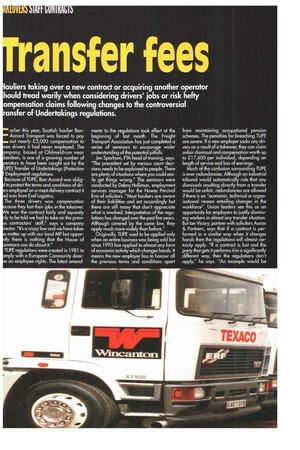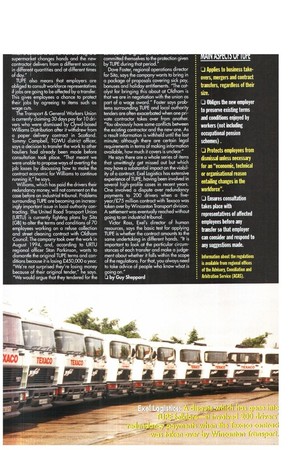ransfer fees
Page 48

Page 49

If you've noticed an error in this article please click here to report it so we can fix it.
arlier this year, Scottish haulier BonAccord Transport was forced to pay out nearly 0,000 compensation to ree drivers it had never employed. The mpany, based at Oldmeldrum near berdeen, is one of a growing number of rotors to have been caught out by the PE) Transfer of Undertakings {Protection Employment) regulations. Because of TUPE, Bon-Accord was obl igto protect the terms and conditions of drirs employed on a meat delivery contract it d won from Exel Logistics. The three drivers won compensation ecause they lost their jobs in the takeover. e won the contract fairly and squarely nly to be told we had to take on the previ us contractors' staff," says a company i rector. "It's a crazy law and we have taken e matter up with our local MP but appartly there is nothing that the House of ommons can do about it."
TUPE regulations were created in 1 981 to mply with a European Community direce on employee rights. The latest amend ments to the regulations took effect at the beginning of last month. The Freight Transport Association has just completed a series of seminars to encourage wider understanding of the potential pitfalls. Jon Sparham, FTA head of training, says: "The precedent set by various court decisions needs to be explained to people. There are plenty of situations where you could easily get things wrong." The seminars were conducted by Debra Holliman, employment services manager for the Howes Percival firm of solicitors. "Most hauliers are aware of their liabilities and act accordingly but there are still many that don't appreciate what is involved. Interpretation of the regulations has changed over the past five years. Although covered by the same law, they apply much more widely than before." TUPE used to be applied only when an entire business was being sold but since 1993 has applied to almost any form of economic activity which changes hands. It means the new employer has to honour all the previous terms and conditions apart from maintaining occupational pension schemes. The penalties for breaching TUPE are severe. If a new employer sacks any drivers as a result of a takeover, they can claim unfair dismissal and compensation worth up to £17,600 per individual, depending on length of service and loss of earnings. Much of the confusion surrounding TUPE is over redundancies. Although an industrial tribunal would automatically rule that any dismissals resulting directly from a transfer would be unfair, redundancies are allowed if there is on "economic, technical or organisational reason entailing changes in the workforce". Union leaders see this as an opportunity for employers to justify dismissing workers in almost any transfer situation. But Ian Vicary, partner with solicitors Aaron & Partners, says that if a contract is performed in a similar way when it changes hands then the regulations will almost certainly apply. "If a contract is lost and the party that gets it performs it in a significantly different way, then the regulations don't apply," he says. "An example would be
supermarcet changes hands and the new contractor delivers from a different source, in different quantities and at different times of day."
TUPE also means that employers are obliged to consult workforce representatives if jobs are going to be affected by a transfer. This gives employees a chance to protect their jobs by agreeing to items such as wage cuts.
The Transport & General Workers Union is currently claiming 30 days pay for 10 drivers who were dismissed by Clywd-based Williams Distribution after it withdrew from a paper delivery contract in Scotland. Tommy Campbell, TGWU district officer, says a decision to transfer the work to other hauliers had already been made before consultation took place. "That meant we were unable to propose ways of averting the job losses by discussing how to make the contract economic for Williams to continue running it," he says. Williams, which has paid the drivers their redundancy money, will not comment on the case before an industrial tribunal. Problems surrounding TUPE are becoming an increasingly important issue in local authority contracting. The United Road Transport Union (URTU) is currently fighting plans by Sita (GB) to alter the terms and conditions of 70 employees working on a refuse collection and street cleaning contract with Oldham Council. The company took over the work in August 1994, and, according to URTU regional officer Stan Parkinson, wants to dismantle the original TUPE terms and conditions because it is losing £450,000 a year. "We're not surprised they're losing money because of their original tender," he says. "We would argue that they tendered for the committed themselves to the protection given by TUPE during that period."
Dave Foster, regional operations director for Site, says the company wants to bring in a package of proposals covering sick pay, bonuses and holiday entitlements. "The catalyst for bringing this about at Oldham is that we are in negotiation with the union as part of a wage award." Foster says problems surrounding TUPE and local authority tenders are often exacerbated when one private contractor takes over from another. "You obviously have some conflicts between the existing contractor and the new one. As a result information is withheld until the last minute; although there are certain legal requirements in terms of making information available, how much it covers is unclear."
He says there are a whole series of items that unwittingly get missed out but which may have a substantial impact on the viability of a contract. Exel Logistics has extensive experience of TUPE, having been involved in several high-profile cases in recent years. One involved a dispute over redundancy payments to 200 drivers when a fiveyea r/.£75 million contract with Texaco was taken over by Wincanton Transport division. A settlement was eventually reached without going to an industrial tribunal. Victor Ross, Exel's director of human resources, says the basic test for applying TUPE is whether the contract amounts to the same undertaking in different hands. "It is important to look at the particular circumstances of each transfer and make a judgement about whether it falls within the scope of the regulations. For that, you always need to take advice of people who know what is going on."
0 by Guy Sheppard




























































































































